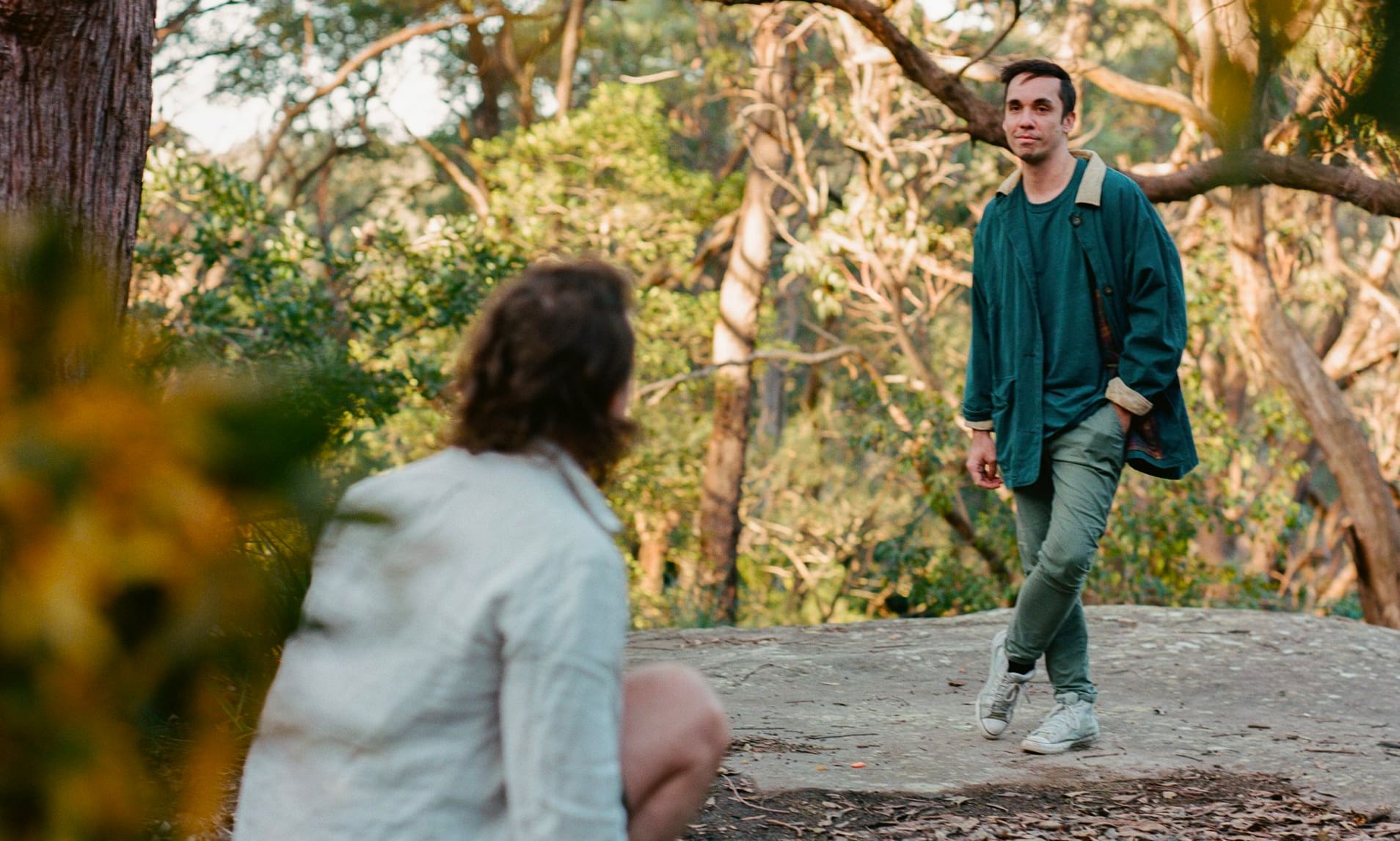Producing a Queer Blak love story set in the midst of Australia’s violent colonial invasion is no easy feat. Harder still is to guide the audience through a mire of tragedy and trauma, all the while urging the freedom of love and life without colonial constraints. Yet, playwright Dylan Van den Berg has written a nuanced exploration of love, loss, and Indigenous culture that is brimming with tenderness and emotional depth.
Starring Guy Simon (Jasper Jones, Redfern Now) as Neddy and Callan Purcell (Hamilton, Bran Nue Dae) as Ty, the production by Griffin Theatre Company is the show’s world premiere, showing until September 23.
Playwright Dylan Van den Berg writes that the play is a reflection on the “lives that were disrupted when those ships hit the shore,” and vitally, “the queer love stories that never got to be written.” This love certainly comes through in the production.
From the moment that Simon and Purcell took the stage, we were enraptured by the chemistry and warmth between the two men. Ty and Neddy begin the play as teenagers, and their innocence and personalities come through vividly in their playful chemistry.
Ty and Neddy are messengers sent from River Mob and Mountain Mob respectively, sent to exchange information on the movement and expansion of whitefellas across their lands. This threat hangs over the growing relationship between the pair; the audience experiences the show with an acute awareness that colonisation has no happy endings.
As the pair grow closer and older, so too does the world around them rapidly change, constantly threatening to tear them apart. Smallpox acts as a reminder of the suffering inflicted upon Indigenous Australians, as well as a potent reminder of the continued threat to queer communities in the form of HIV and Monkeypox, and how healthcare, or a lack thereof, can be used as a tool of cruelty by oppressive structures.
The titular Yella tree takes centre stage, its sprawling branches grounding the performance in a singular bush location. The walls of Griffin’s SBW Stables Theatre have been transformed into a plywood canvas, with charcoal markings and symbols emerging throughout the play, effectively representing the changing physical and cultural environment the characters inhabit.
The production makes fantastic use of both lighting and costume to effectively set the scene on what is otherwise a minimal staging. Strobe lighting leaves the infliction of colonial violence to the imagination,
The costuming of Ty and Neddy is particularly evocative — both men are dressed in contemporary clothing, T-shirts and shorts, denoting the youth of these characters and further emphasising for the audience the impact of colonisation on innocence. Most importantly, their costuming links this colonial past to the present, giving their experiences a vivid sense of immediacy and relationality.
In conversation with Honi Soit, Purcell discussed what he hopes audiences can gain from the story told by Whitefella Yella Tree, noting the importance of plays like this for a queer Indigenous audience.
“[When] queer mob see this play, it’s a safe space,” he said. “They see themselves within that play.”
The show dispels any myths about life before colonisation, with Purcell telling Honi that it is “liberating” to tell these stories with “nothing to hide”.
“They’ve [Ty and Neddy] learned that from their elders, and they’ve learned that from their mobs, and they’ve learned that from what they’ve seen in nature that it’s a natural extension of what they are doing in their lives, and that love is the natural thing. To love and be loved is a natural part of life.”
The queer Blak love that is displayed on stage is certainly not new, but representations of it are few and far between in media — particularly an institution like theatre, famous for too often entrenching class and race-based inequalities. Purcell noted the importance of bringing these stories to the audience who come from that institution, saying we must “challenge those audience members who may be [made] uncomfortable by this narrative… get them out of their comfort zone.”
The production is impressive in the way that it emotively communicates such grief by distilling it down to the experience of these two young men.
“These are our family’s experiences of colonisation. And so we, through the specific experiences of ancestors and through our brothers and sisters and our cousins, can then reflect on where to next in that fight against colonisation”
Throughout the show, the boys yearn for the simplicity of enjoying their love. To the audience, the boys’ love is shown so shamelessly and holistically — the denial of this basic need seems incomprehensible.
“It comes from nature, that form of love and tenderness… it is something that is before colonisation,” Purcell explained. “It’s a gift to be able to revisit a world without shame.”
Whitefella Yella Tree is playing at Griffin Theatre Company in Darlinghurst until September 23. Tickets are $62 full price, $38 for Under 35s, and Monday Rush tickets are available for $20.





